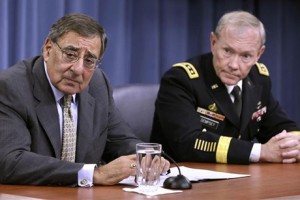Special to WorldTribune.com
WASHINGTON — Iran has been developing a militia loyal to Syrian
President Bashar Assad.
Officials said Iran’s Islamic Revolutionary Guard Corps was providing
training and weapons to an unidentified militia meant to fight the Sunni
revolt in urban areas. They said the militia would be similar to IRGC’s
Basij, which quelled unrest throughout Iran in 2009.

“There’s now indications that they’re trying to develop or trying to
train a militia within Syria to be able to fight on behalf of the regime,”
U.S. Defense Secretary Leon Panetta said.
In a briefing at the Defense Department on Aug. 14, Panetta provided few details of Assad’s new militia. Other officials said the new IRGC-trained force was meant to help the Syrian Army during the expanded Sunni revolt, particularly in Aleppo.
“I actually think that’s why Iran is stepping in to form this militia,
to take some of the pressure off of the Syrian military,” Gen. Martin
Dempsey, the chairman of the Joint Chiefs of Staff, said.
In early 2012, IRGC sought to enhance Assad’s Shabiha militia. Shabiha, comprised mostly of Alawites, was used to target
civilian protesters and deemed the bloodiest force loyal to Assad.
But officials said Shabiha failed to counter the growing capabilities of
Sunni rebels. They cited high casualties among Shabiha,
trained in little more than the use of light weapons.
The United States has assessed that Assad was steadily losing his
military and political forces. Officials said Assad was unable to stop
defections, desertions as well as the refusal of many Syrian soldiers to
enter rebel-held areas.
“Any army would be taxed with that kind of pace,” Dempsey said.
Opposition sources said IRGC has brought at least 3,000 troops to Syria
in mid-2012. They said most of the forces were believed to come from special
operations units and included hundreds of snipers.
“It [Iran] tries to bolster a regime that we think, ultimately, is going
to come down,” Panetta said.

You must be logged in to post a comment Login